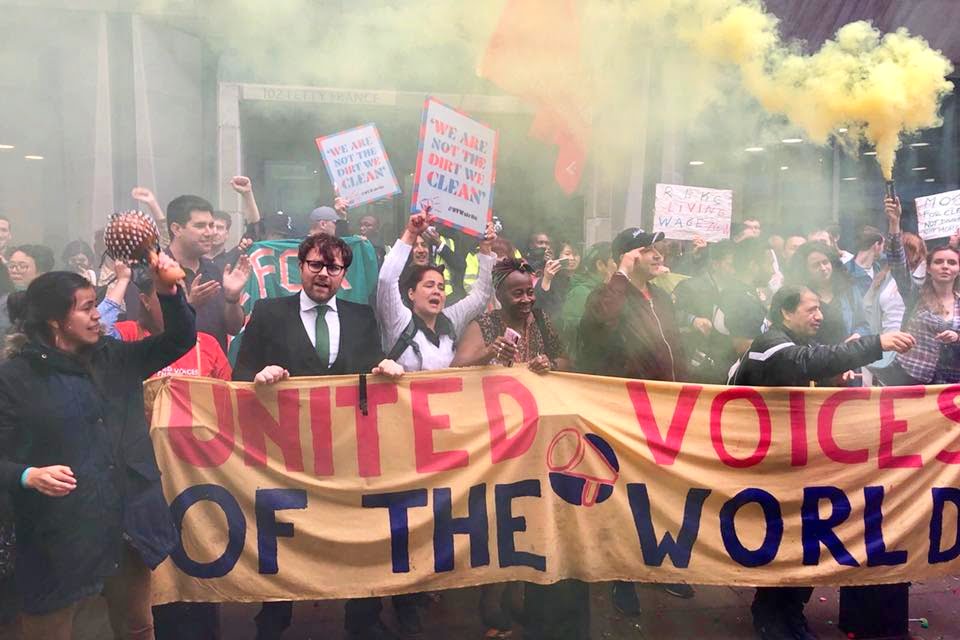Low-paid and highly exploited workers are getting organised and fighting back, demanding decent pay and conditions.
Cleaners at the Ministry of Justice (MoJ) and at Kensington and Chelsea (K&C) council buildings recently took part in co-ordinated three day strike action, from 7-9 August, organised by the United Voices of the World (UVW) union.
Workers from the MoJ and other sights in K&C joined flying pickets in order to make the largest impact across the different sights. The workers were joined by local activists from K&C Momentum, the Labour MP Emma Dent Coad, and local Labour councillor Pat Mason.
Struggling to survive
Socialist Appeal caught up with striking workers at picket lines at Kensington town hall, where there was a large and boisterous picket line of strikers and their supporters.
At the picket line, we spoke with William, a worker from Ecuador who works at the Chelsea Old Town Hall.
“I work Monday to Saturday, 13 hours a day. I must work all these hours to earn enough to live in London, on minimum wage. After paying rent, bills, and necessities – and sending money to my family in Ecuador – I am left with £100 a month.
“I’m single, so I’m better off than many of my colleagues. My best friend is worse than me – she has a family with children. She works full time and earns £1,100 a month. The rent for her apartment is £1,500 a month. How can she survive?
“The name says union. We help each other. I hope this strike will be an example for the rest to follow.”
The cleaners at K&C work for global services giant Amey – a company which makes billions in profits off the back of its workers.
The only reason for outsourcing is to drive down the wages and conditions of workers. The outsourcing company then skims off profit by taking the difference between the contracted price and the pay.
In short, it is a means of privatising everything and handing over all the gains to the friends of the Tory politicians.
Prevarication
During the first day of strike action, a council spokesman initially announced that staff would be taken in-house. But this offer was quickly retracted in a later press statement.
That evening, the UVU then occupied the offices where a council planning meeting was taking place. The occupiers agreed to leave the building after assurances that council representatives would speak to the workers on the picket lines at 9am the following morning.
The following day, the councillors came out to meet the workers, looking highly uncomfortable: Barry Quirk, chief executive of K&C council; Catherine Faulks, a leading Tory councillor who once scandalously described the council charging rent on burnt out Grenfell flats as being a “tiny thing”; and two other nameless Tory councillors.
They thanked the workers for bringing the situation of poverty wages to their attention. They thanked the workers for the manner of their strike. And they thanked the workers for letting them continue with their meeting the previous evening after they had agreed to speak to them on the picket lines. They asked for acknowledgment that they had kept their word and were indeed present at 9am, as they had promised.
One after another they all explained how they were each personally in favour of the living wage. This despite the fact that Catherine Faulks voted against implementing the living wage when faced with countless motions from Labour councillors over the years.
But – apparently – these things take time. In two months or so they said they would be able to talk…Unfortunately, it is a political decision, and the leader of the council is away on holiday…They didn’t know when she would be returning…Her daughter was getting married so…But they would be recommending that the living wage be paid to the workers.
These Tory councillors were all too eager to leave. They were reminded that the cleaners had been waiting for hours. The councillors could surely wait five more minutes to answer questions.
Escalate
One worker explained how she had been suffering from a slipped disk; that her doctor had recommended time off work and to work less hours. But her bosses refused to make any allowances.
Her condition had deteriorated due to long hours. She was not paid sick pay. The only time her employers noticed was when she couldn’t go to work. She asked what responsibilities her employers had towards her health – health that they were sacrificing in order to squeeze every drop of profit out of her.
Ultimately nothing was decided. A date was set to meet with the leader of the council, Elizabeth Campbell – leader of a council that increased its PR budget by £2 million overnight and spent £5 million on external lawyers in the wake of the Grenfell tragedy.
But being ‘personally’ in favour of the living wage doesn’t pay the bills. Words don’t put food on the table. Promises to talk in a month don’t pay the rent.
The dispute will continue and the action will escalate until the cleaners’ demands are met.






